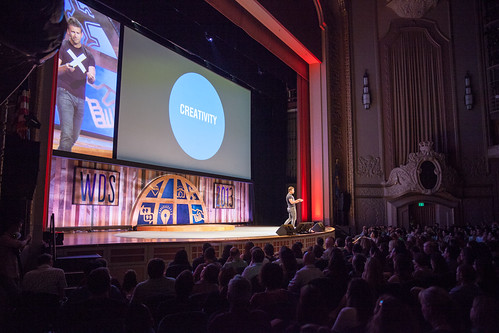
Last Saturday, 35,000 shareholders gathered in Omaha to hear Warren Buffett and Charlie Munger speak. The two men lead Berkshire Hathaway, which is now the fifth-most valuable company in the world, valued at over $264 billion.
I was there, too — as the guest of a family friend, Steve, who’s a shareholder. I didn’t want to pass up the chance to hear one of history’s greatest business minds speak.
Here’s what I learned from my day in Omaha:
1. There Is No Roadmap
Some people come to Omaha looking for answers about the company, but many are there to find the secret to life. This isn’t an understatement: People really do think Warren’s figured out the secrets to the universe.
But the thing Warren said over and over again was simple: There is no roadmap. There is no right way forward. And there are no shortcuts.
2. But… Some Things Do Really Matter
Great people, mostly. Warren talked often about how great his management team was. He kept saying things like, “If I could clone so and so, I would.” When you have great people in place, and you give them the tools to do their work, a lot of great things can happen.
3. Have A Partner Smarter Than You
Warren’s partner is Charlie Munger, the whip-smart no. 2 of Berkshire. He’s been with the company for decades. He’s also a billionaire. His job is to know more than Warren. And he does, which is pretty incredible — Warren’s no dummy.
4. Make Sure That Partner Knows How To Call You On Your Shit
I love this about Charlie: Whenever he thinks Warren’s wrong, he’ll call him on it. “Just because Warren thought something 20 years ago doesn’t mean it’s a law of nature,” he told shareholders at one point. Everyone should have someone willing to call them out like that.
5. That Spark Matters
Have you ever seen that photo of Einstein with his tongue out? There’s something unexpected about that photo — something deeply human. Einstein is this towering figure in history, and yet, there’s a photo of him acting like a fool.
And there are all sorts of photos of Warren acting goofy. He’s got that spark, too — that mix of humor and childishness — and people recognize it. They light up around it.
6. Don’t Be So Serious
Warren was surprisingly funny at the meeting. At one point, he got asked about Harley Davidson, and then gave a long answer breaking down the numbers. Then he added:
“Any company that gets its customers to tattoo ads on their chests can’t be all bad.”
Perfect.
7. Go Where You Want To Go
At various points during the meeting, Warren was pressed for answers about what’s happening with GEICO, one of Berkshire’s largest holdings. Other companies are trying out new ways to measure insurance risk, they said. Will Berkshire follow?
Warren just stood his ground.
“In the end, we know what we’re willing to do…,” he said. “And if we can’t do it, we will watch for a while…. You can’t afford to go along with the crowd.”
I love that. Go where you want to go — don’t go blindly chasing the puck.

8. Admit When You’re Wrong
It’s something both Charlie and Warren were willing to admit. They’ve made mistakes. They’ve owned up to their mistakes.
And the other thing that Warren reminded me: People often forget about this mistakes.
“We’ll be back here in 2 or 3 years, and I’l say, ‘I told you so,'” Warren said, “and hope you have a bad memory.”
9. Be Willing To Say ‘I Don’t Know’
One of my favorite moments came during a question about the Fed. Here’s how Charlie and Warren answered the question:
Charlie: “The basic answer is, I don’t know.”
Warren: “I don’t have anything to add.”
**laughs**
I love that. These two men have seen pretty much everything that can happen in a lifetime. They have lived through wars, through financial bubbles, through some amazing technological changes. So for them to say, “I don’t know,” that’s a statement that carries a lot of weight.
They know the power of their words. They know that their words can move markets. And so they make their predictions and their statements carefully. They won’t make a big statement until they’re sure — isn’t that something we should all emulate?
10. Community Comes First
There’s one thing I didn’t expect from the Berkshire meeting. It’s a gathering of thousands of people, many of whom are millionaires. And yet… it felt like a convention of like-minded fans. The way people talk about Berkshire and their staff, it’s like they know them. They feel a connection to this company and its staff.
That’s really amazing. Berkshire is a really inclusive place — shareholders feel like they’re part of a company that works for them. And that community supports Berkshire back and acts as evangelists for Warren and Co. It’s the community that’s made Berkshire what it is.
11. Don’t Get Jealous
“Envy is the one sin there’s no fun in,” Charlie told the crowd, and it’s tough to argue with that. Sure, there are times when your neighbor or your friend catches onto the Next Big Thing and makes it big. But Warren and Charlie cautioned against chasing that. Just do what you do, and don’t worry about everyone else.
12. Find Heroes Everywhere
Warren’s is a guy named Benjamin Graham, whose book on investing changed the way Warren thought about business. He told shareholders, “My life would have been different if Graham hadn’t written that book.”
But he also noted several other greats: Authors, fellow investors, mentors. Before you can lead, sometimes you have to find other people who’ve already started ahead on the trail.
13. Simplicity Is A Huge Advantage
Something Steve pointed out to me: Berkshire has almost 290,000 employees. But their headquarters has only 24 staffers.
So how do they get things done? By keeping things simple — from management structure to day-to-day routine. By not wasting time on the little details, it gives them more time to focus on the big picture stuff.
14. A Lot Of The Best Stuff Happens By Accident
You can’t plan out everything. Just show up and do the work, and see where it takes you.
“We are leaving behind a field that is very competitive and getting to a place where we’re more unusual,” Charlie said of Berkshire. “This was a very good idea. I wish we’d done it on purpose.”
16. Sell Sell Sell
At the meeting, there was a convention floor where you could buy products from Berkshire companies. Everything — literally dozens of products — featured Warren’s face. The man is shameless when it comes to sales. But that’s also made him one of the most visible businessmen in the world, and in turn, one of the most respected. You can’t lead if no one’e listening — so sometimes, you’ve gotta sell yourself a little.

16. Don’t Go Crazy
Another brilliant Charlie quote: “We’ve always tried to stay sane, and other people like to go crazy.” This is where staying grounded in your principles matters. When you go chasing stuff you don’t understand, you get distracted. Focus on your work, and focus on putting the right systems in place to do that work well.
17. Look Further
The more work you do, the more you begin to understand what’s possible. Warren talked a lot about cumulative knowledge. After a lifetime of work, he knows a lot about a lot.
So when he sees something that gets him excited, he’s willing to jump on it. “We see things that shout out to us: Think further, look further,” he said. Don’t be afraid to chase big things.
18. Love The Work You Do, And Do The Work You Love
“You have to love something to do well at it,” Warren said. “It is an enormous advantage if you absolutely love what you’re doing every minute of it. The nature of it is that that intensity adds to your productivity.”
And that’s it. When you find the stuff you love, you grind at it every day. You throw yourself into your work. You’ll work your hardest when you’re doing something you really care about.
So don’t settle for anything that doesn’t make you want to work that hard. Go out, find what you love, and do the work.









